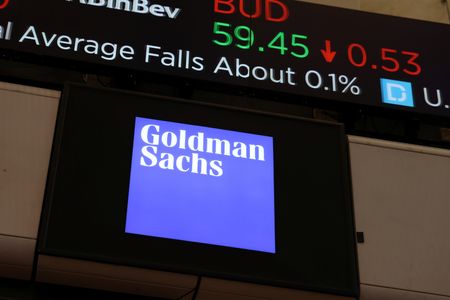By Saeed Azhar and Niket Nishant
NEW YORK (Reuters) -Goldman Sachs’ profit beat Wall Street estimates, fueled by a recovery in underwriting, deals and bond trading in the first quarter that lifted its earnings per share to the highest since late 2021.
The bank’s shares rose more than 3% on Monday after it reported a strong comeback in investment banking — its traditional mainstay — after a slowdown over the last two years.
Rivals JPMorgan Chase and Citigroup cited improving conditions for dealmaking on Friday when they reported profits that beat market expectations. But their executives also cautioned about risks to the economic outlook, including the uncertain path of U.S. interest rates.
Goldman’s profit rose 28% to $4.13 billion, or $11.58 per share, in the first quarter. That was higher than the $8.56 earnings per share (EPS) that analysts expected.
It is the highest EPS since the third quarter of 2021, according to LSEG, and beat market estimates for a slight decline.
The bank’s stock has climbed more than 4% this year, compared with an almost 7% drop for rival Morgan Stanley.
“We’re in the early stages of a reopening of capital markets,” CEO David Solomon told investors on a conference call, citing rising risk appetite among investors for initial public offerings and solid debt underwriting activity. “We continue to be constructive on the health of the U.S. economy.”
Oppenheimer analyst Chris Kotowski wrote in a report that the earnings were a “near-perfect print,” with most profit drivers performing better than expected.
The results could relieve pressure on Solomon after a foray into consumer banking lost billions, drawing rancor and prompting senior departures.
“A rebound in a variety of capital market sensitive revenue areas may finally be underway, while an exit from the ill-fated entry into consumer businesses has removed some headline risk,” said Stephen Biggar, a banking analyst at Argus Research.
As a leading adviser for mergers and acquisitions, Goldman handled some of last year’s biggest deals, including Exxon Mobil’s $60 billion purchase of Pioneer Natural Resources.
Deals activity could also increase as private equity firms get more involved, Solomon said.
“The LP (limited partner) community is putting a lot of pressure on the financial sponsor community to return more capital,” Solomon said. “And so I do think the pace is going to pick up,” he said.
ARTIFICIAL INTELLIGENCE
Goldman Sachs is advising clients on artificial intelligence, including potential commercial applications, regulation and impact on jobs.
“There will be significant demand for AI-related infrastructure and as a result, financing, which will be a tailwind to our business,” he said. “Like with any emerging technology, a thoughtful approach and keen eye on risk management will be crucial.”
The success of OpenAI’s ChatGPT has energized investors, who have been pouring money into promising AI startups.
The Federal Reserve has so far managed to steer the economy toward a so-called soft landing, in which it raises interest rates and tames inflation while avoiding a major downturn.
As corporations regain some confidence to raise money in capital markets, equity and bond underwriting have rebounded. Improving conditions have also spurred companies to strike more deals.
Goldman’s investment banking fees climbed 32% to $2.08 billion, propelled by higher fees from underwriting debt and stock offerings, as well as advising on mergers.
Revenue from trading in fixed income, currencies and commodities (FICC) rose 10% to $4.32 billion, helped by record financing revenue in mortgages and structured lending.
Equities revenue jumped 10% to $3.31 billion.
The asset and wealth management division generated record quarterly management fees of $2.45 billion. Meanwhile, assets under supervision rose to a record $2.85 trillion, with wealth client assets reaching $1.5 trillion. The two businesses were joined as part of a reorganization in 2022.
Platform Solutions, the unit that houses some of Goldman’s consumer operations, garnered 24% higher revenue. The bank expects the unit to be profitable in 2025 and continues to slim down the consumer operations.
“We are witnessing tangible strides by the company as it continues to transition away from the consumer banking segment allowing it to focus on the traditional side of the business,” said David Wagner, a portfolio manager at Aptus Capital Advisors LLC, which owns Goldman’s stock.
“Investors want to see what the clearer picture would be from the company and this report is hopefully just the beginning.”
Solomon, who once championed the retail push, has been criticized for the strategy.
Earlier this month, top proxy adviser Institutional Shareholder Services (ISS) urged shareholders to vote for the bank to split its chairman and CEO roles, both of which are held by Solomon. ISS cited his “missteps and steep losses.”
Goldman has also scrapped its co-branded credit cards with General Motors, and a similar partnership it has with tech giant Apple is facing an uncertain future.
The bank’s provisions for credit losses jumped to $318 million compared to a net benefit of $171 million a year ago. The increase was tied to its credit cards and wholesale loan portfolio.
Goldman had a headcount of 44,400 at the end of March, 2% lower than the fourth quarter. It had laid off thousands of employees in 2023, including a January round of cuts that was its largest since the 2008 financial crisis.
(Reporting by Saeed Azhar in New York and Niket Nishant in Bengaluru; Editing by Lananh Nguyen, Arun Koyyur and Nick Zieminski)

